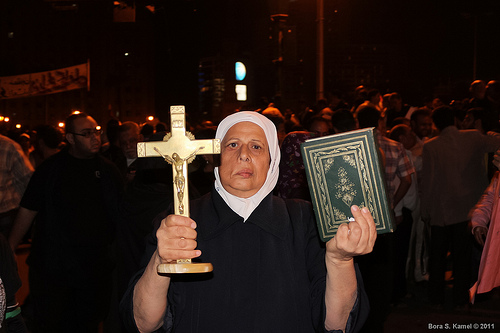
The clashes on Sunday during the funeral of four Egyptian Christians killed earlier in the weekend were condemned across the political spectrum; however, the incident has attracted attention in the op-ed pages of Egypt’s independent press primarily as another sign of the continuing political decay of the country. Here are a few excerpts:
“Sectarianism in the age of the Brotherhood”
Writing in Al Masry Al Youm, Amr El Shobaki observes that while the continued collapse of security, the ‘absence’ of the state, and the inability of the authorities to enforce the law in Egypt has affected Egyptian society as a whole, Egyptian Christians have been the most exposed to harm. He states:
What happened in Khusus and in front of St. Mark’s Cathedral in Abbasiya is the final warning bell that we won’t have a chance to regret ignoring if matters spin out of control. This situation is the result of a religious discourse that is opposed to the idea of citizenship and enshrines discrimination every day, and a weak state that is on its way to total absence.
“So, it’s a completely successful failure”
Writing in Al Tahrir, Ibrahim Eissa – editor in chief and outspoken commentator – once again takes firm aim at the political performance of President Morsi and the Muslim Brotherhood. He presents the Sunday clashes as one more episode in a long line of failures:
Look at the Sinai and what is happening on our border with Palestine and in the mountains and desert of the peninsula. Then look at what some fabricate about Hala’ib and Shalateen. Consider the cities of the Suez Canal and the problems they have had with the ubiquitous failure of Brotherhood rule. Next think about the daily strikes and protests on every square inch of the country’s governorates, not to mention the petrol crisis, the diesel crisis, the power crisis, and cooking gas crisis. Now you have not only sectarian clashes and the killing of Copts, but also vicious aggression against the funerals of the Coptic victims. What is this vileness that competes with even the barbarity of the jahiliyya?
Writing in Al Shorouk, Emad El Din Hussein takes a different tack, describing the horror felt by the employees of Al Shorouk as they learned that one of their colleagues, Bishoy Wasfy, had been gravely wounded while covering the events of Sunday. He goes on to consider the human implications of the unrest and clashes that have rocked Egypt since the revolution:
In journalism we write every day about the victims – those killed and wounded in every global hotspot. We treat those victims, regrettably, as numbers. We don’t stop to consider how the victim’s family and loved ones feel, how they receive the news and live those first (terrible) moments. We don’t consider how they adjust to the new reality. When the time comes that your relative or colleague is the one wounded, you go through those first moments, and you are forced to realize…that the victim is not just a number to be added to the numbers reported by the papers or the TV channels, only to be forgotten or moved aside for a new victim.
Maybe Bishoy was lucky because he works at a newspaper that will write about him and bring attention to his case. But thousands of victims in every incident are never mentioned, and remain just numbers.
Andrew Ver Steegh is a graduate student at the University of Chicago. He was a Fulbright Fellow in Egypt in 2010-2011.
Photo: Bora S. Kamel
Image: Copts%20Bora%20Kamel.jpg
